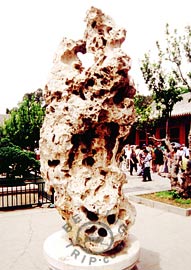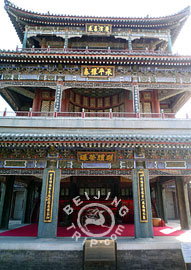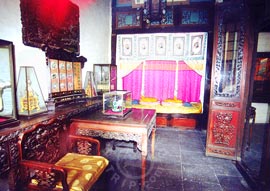 Hall of Jade Ripple
Hall of Jade Ripple
 The Hall of Jade Ripple (Yulantang) is a courtyard consisting of a main hall and two subsidiary halls. It was Emperor Guangxu's dwelling on his visits to the garden. The original halls had back doors which communicated with other halls or the lakeside.
The Hall of Jade Ripple (Yulantang) is a courtyard consisting of a main hall and two subsidiary halls. It was Emperor Guangxu's dwelling on his visits to the garden. The original halls had back doors which communicated with other halls or the lakeside.
Emperor Guangxu, a nephew of notorious Empress Dowager Cixi, ascended the throne at the age of four as a figure-head - It was Cixi who actually exercised the imperial power. In 1898, Guangxu started a political reform to overturn the outdated laws. This resulted in a fierce conflict with Cixi, the head of conservatives. The ill-fated reform lasted only 103 days and was aborted due to Cixi's suppression. After the failure of the 1898 Reform Movement, the hall was the place where Emperor Guangxu was imprisoned for ten years. Every year, the Emperor was brought here and confined to this small courtyard until his death while Cixi enjoyed her retreat in the garden. During that time, additional walls were built in the halls to prevent Guangxu from escaping and contacting other people. Even today, walls, the witness of the court coup, can still be seen in some rooms.
 Garden of Virtue and Harmony
Garden of Virtue and Harmony
Construction of the Garden of Virtue and Harmony (Deheyuan) commenced in 1891 and was completed in 1895. It was designed as a theatre for the Empress Dowager Cixi, and consists of a theater building, and two halls, Yiledian (Hall of Nurtured Joy) and Qingshantang (Hall of Celebrating Benevolence). It is the largest of the three famous theaters built in the Qing Dynasty (1644-1911), the other two being the Changyin Pavilion of the Forbidden City and the Qingyin Pavilion of the Mountain Resort in Chengde, Hebei Province.

The theatre building, 21 meters (69 feet) high and 17 meters (56 feet) wide, consists of three storeys with colorful multiple eaves and elegantly raised corners. With raise catwalks in the ceilings and a winch on the top floor of the building, performers could seem to come down from the 'heaven' or emerge out of the 'earth'. Beneath the ground floor, there is a well and ponds which could spout suddenly to create a water scene. The lighting and sound systems heighten the whole effect. In the past, when there was thunderous clamor on the stage, Empress Dowager Cixi would enjoy the play cozily in the Hall of Cultivated Joy and afterwards rested at the Hall of Celebrating Benevolence.
Now, the garden has been converted into exhibition halls to display the daily utensils used by the imperial family, including bronze wares, porcelains, jade articles and other precious objects.
 Hall of Joyful Longevity
Hall of Joyful Longevity
The Hall of Joyful Longevity (Leshoutang) was the occasional residence of Empress Dowager Cixi in the late Qing Dynasty (1644-1911). This large complex enjoys a prime position, facing the Kunming Lake, and backing onto the Longevity Hill. In front of the hall, bronze deer, cranes, and vases are displayed, signifying peace with their combination of Chinese elements. Planted inside the yard are magnolias, haitang (Chinese flowering apples tree) and peonies, symbolizing riches and honor. The exquisite rockery in the courtyard has existed since the reign of Emperor Qianlong, the fourth emperor of the Qing Dynasty.

The main hall is divided into a living room in the center, bedroom in the west and dressing room in the east. All the rooms are decorated in an imperial style, luxurious and delicate. Positioned in the living room are a throne, a desk, glass screen and fans. Beside the throne are four bronze incense burners and two large blue and white porcelain bowls. The latter performed a double function: to hold fruit and to give off perfume.
It is said that the hall was also the first place to be installed with electric lights in China and Cixi the first person to use electricity. Only then was its use spread gradually throughout China.
 Go to the Next Attractions: Bronze Ox & Marble Boat
Go to the Next Attractions: Bronze Ox & Marble Boat